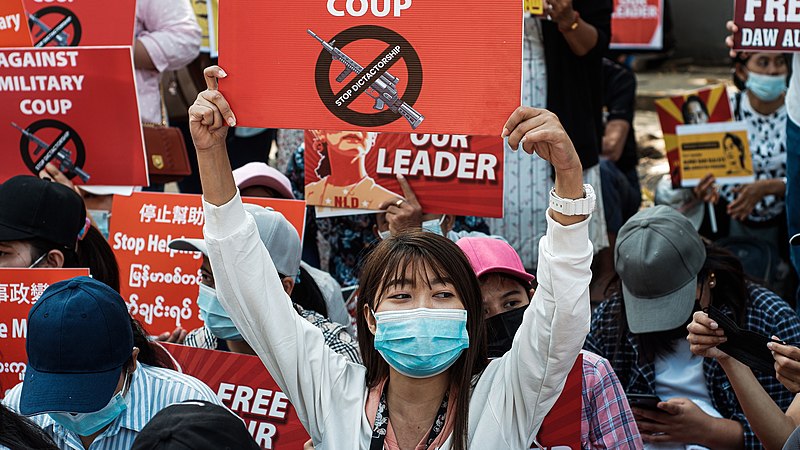Opinion | Coup anniversary marks ticking clock in Myanmar
Photo courtesy of Wikimedia Commons
Protester holds a sign against the military coup in Myanmar on Feb. 14, 2021. Senior columnist Eddie Ryan discusses the anniversary of Myanmar’s coup being overshadowed by the Ukraine situation.
February 17, 2022
With all eyes on Ukraine, the sorry anniversary of Myanmar’s coup passed too quietly. The two crises aren’t dissimilar; both involve fragile sovereignty, perpetually threatened.
But as Ukraine fears for its independence, the people of Myanmar are fighting in the streets and jungles to wrench theirs back. What began as a wave of peaceful demonstrations has begun to look like civil war.
The word evil is invoked both too often and too little in political discourse. In this case, it’s apt. The foul visage of Myanmar’s ruling junta oozes cruelty and caprice.
Though unpleasant to look upon, it’s a face quite familiar to the battle-tested Burmese. For most of its post-colonial history, Myanmar has endured the vicious rule of the Tatmadaw, as its military is known.
The class of generals who run it are notorious for their malice. Only in the past decade or so have promising democratic reforms been made. This coup is thus a frustrating reminder of the difficulty of sustaining democratic progress when former overlords maintain a foothold in government.
Get The Daily Illini in your inbox!
Now, after witnessing the popularity of Aung San Suu Kyi’s National League for Democracy, the military has apparently had enough. It has returned to polishing its reputation for human rights crimes.
One can simply list the offenses: murder, rape and torture of civilians, teargas used against protesters, airstrikes on whole villages. Also notable is the military’s strategy of withholding COVID-19 aid to choke resistance networks, deepening a grave humanitarian crisis.
Or, one can relay disturbing stories. This past Christmas Eve, a Tatmadaw unit prowled Myanmar’s eastern Kayah state in search of resistance cells. Finding fleeing civilians, among them two aid workers, the soldiers opted for sadism.
The civilians were slaughtered en masse, tied up and burned to death. Footage of their charred remains is available and ought to be compulsory viewing. Such parades of barbarism have a name in Myanmar — ”clearance operations” — and they characterized the Rohingya genocide.
In the face of such an enemy, the resistance glows. And it’s formidable.
With Suu Kyi detained on an array of fabricated charges, the opposition has coalesced. Ousted democratic leaders have formed the clandestine National Unity Government, recognized by France and the European Union parliament as legitimate. A new guerilla resistance body known as the People’s Defense Forces is also putting up a fight with backing from Myanmar’s experienced ethnic militias.
Though reports of teenagers leaving school to fight in the jungle are sobering, they’re indicative of something promising. Myanmar’s civilian corpus, with all its ethnic diversity, is more unified than ever. They want to topple the regime together. Even the Bamar majority, which traditionally has upheld the ethnic hierarchy, seems to be souring on the generals.
What’s more, new generations of Burmese freedom fighters want to enshrine this commitment to ethnic equality in future democratic programs. They hope to rectify Suu Kyi’s gross failures, especially her role in the Rohingya genocide.
By some accounts, the military is on its back foot in the face of all this. If the international community is going to act — though the people of Myanmar have started to believe they’re on their own by now — it has to be soon.
The best hope for democratic restoration is a coordinated international campaign of crippling sanctions. Necessary components include a full arms embargo and tough oil and gas sanctions, which would hit the junta’s biggest revenue sources at a time when it’s losing cash fast. Many Burmese say they’ll endure painful sanctions if it means quickly forcing the military into submission.
Yes, the international community has its hands full at the moment with Ukraine. However, this isn’t an excuse to neglect the window of opportunity for effective diplomatic pressure in Myanmar.
Cambodia is the junta’s only real friend. Still, as it happens, Russia has supplied the Tatmadaw with weapons, and China is a more hesitant ally. Could the U.S. sneak a provision on such arms sales into the Ukraine negotiations? Perhaps Russia would be open to cutting off the Tatmadaw in exchange for a more explicit assurance that Ukraine won’t join NATO anytime soon, which is necessary anyway.
That suggestion is probably far-fetched, but there’s certainly a need for creativity here. The late Sergio Vieira de Mello specialized in sitting across the table from dictators and negotiating clever settlements that saved lives. While the moral indignation I’ve expressed is appropriate, what’s really needed is the poise to confront this regime constructively.
As Myanmar languishes, I wonder: where is the next Sergio? Who will provide the spark to rescue the country from this miserable relapse?
Eddie is a junior in LAS.







